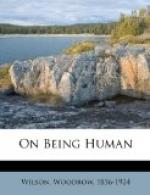When you say that a book was meant to be read, you mean, for one thing, of course, that it was not meant to be studied. You do not study a good story, or a haunting poem, or a battle song, or a love ballad, or any moving narrative, whether it be out of history or out of fiction—nor any argument, even, that moves vital in the field of action. You do not have to study these things; they reveal themselves, you do not stay to see how. They remain with you, and will not be forgotten or laid by. They cling like a personal experience, and become the mind’s intimates. You devour a book meant to be read, not because you would fill yourself or have an anxious care to be nourished, but because it contains such stuff as it makes the mind hungry to look upon. Neither do you read it to kill time, but to lengthen time, rather, adding to its natural usury by living the more abundantly while it lasts, joining another’s life and thought to your own.
There are a few children in every generation, as Mr. Bagehot reminds us, who think the natural thing to do with any book is to read it. “There is an argument from design in the subject,” as he says; “if the book was not meant to be read for that purpose, for what purpose was it meant?” These are the young eyes to which books yield up great treasure, almost in spite of themselves, as if they had been penetrated by some swift, enlarging power of vision which only the young know. It is these youngsters to whom books give up the long ages of history, “the wonderful series going back to the times of old patriarchs with their flocks and herds”—I am quoting Mr. Bagehot again—“the keen-eyed Greek, the stately Roman, the watching Jew, the uncouth Goth, the horrid Hun, the settled picture of the unchanging East, the restless shifting of the rapid West, the rise of the cold and classical civilization, its fall, the rough impetuous Middle Ages, the vague warm picture of ourselves and home. When did we learn these? Not yesterday nor today, but long ago, in the first dawn of reason, in the original flow of fancy.” Books will not yield to us so richly when we are older. The argument from design fails. We return to the staid authors we read long ago, and do not find in them the vital, speaking images that used to lie there upon the page. Our own fancy is gone, and the author never had any. We are driven in upon the books meant to be read.
These are books written by human beings, indeed, but with no general quality belonging to the kind—with a special tone and temper, rather, a spirit out of the common, touched with a light that shines clear out of some great source of light which not every man can uncover. We call this spirit human because it moves us, quickens a like life in ourselves, makes us glow with a sort of ardor of self-discovery. It touches the springs of fancy or of action within us, and makes our own life seem more quick and vital. We do not call every book that moves us human.




